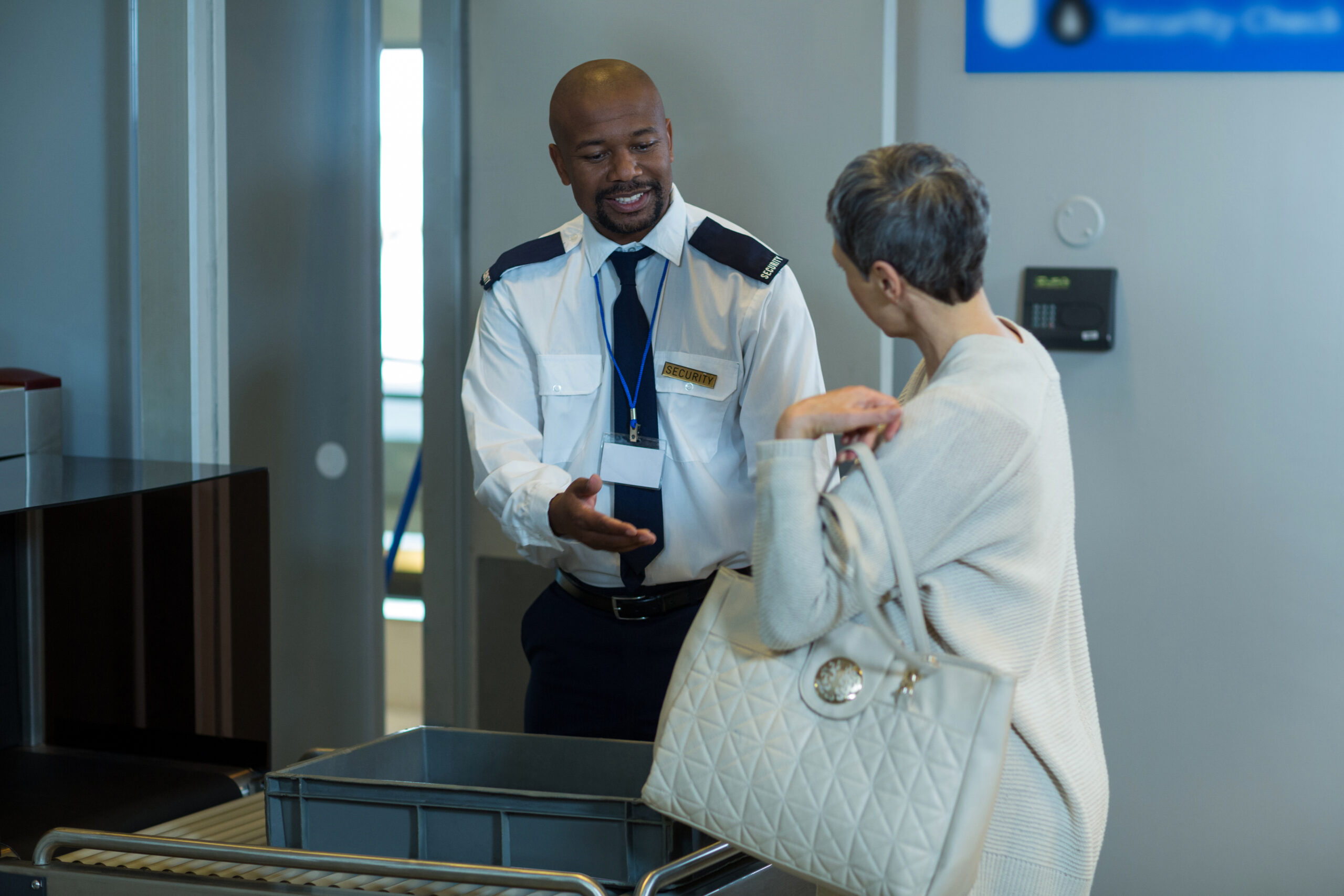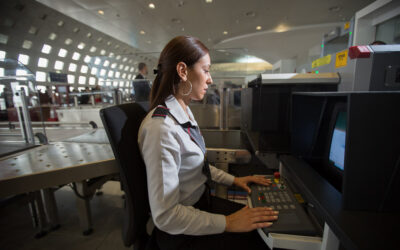1. Security as a Human Challenge
In an era of increasing global mobility and evolving threats, airport security is critical to public safety. While advanced systems and protocols play a significant role, the foundation of this security lies in the capabilities of the men and women trained to address complex and unpredictable scenarios. Their ability to combine technical precision with human insight transforms security measures into proactive and sustainable solutions.
In an industry constantly under pressure, how do we ensure individuals remain at the heart of security processes, not only as operators but as essential decision-makers? How can we empower them to meet these challenges with resilience, adaptability, and unwavering professionalism?
This question highlights the undeniable importance of human skills, which surpass the utility of any tool or protocol. These abilities form the backbone of effective security operations.
2. Human Skills: A Decisive Factor
The efficiency of airport security often depends on agents’ ability to handle situations beyond routine operations. Technology or static protocols cannot replace their capacity to interpret subtle signals and make ethical decisions under pressure.
Reading Behaviors: The Subtle Art of Intuition
Security agents routinely encounter behaviors that challenge standard procedures. Identifying potential threats requires detecting micro-expressions, body language inconsistencies, or irregular travel patterns. Studies in behavioral psychology emphasize the significance of training agents in micro-expression analysis and situational awareness. For instance, Ekman’s foundational research on emotional leakage demonstrates how fleeting facial expressions can reveal concealed intentions (Ekman, 2009).
At Roissy Airport in 2019, an agent identified a smuggling attempt based on an unusual pattern in a passenger’s nervous movements and inconsistent responses during questioning. This type of detection relies on human judgment refined through experience and specialized training rather than reliance on automated systems.
Acting Ethically: A Foundation for Trust
Ethical behavior is the bedrock of credibility and operational effectiveness in airport security. Specific personality dimensions—fairness, humility, and responsibility—have been consistently linked to strong ethical decision-making in high-pressure environments. These traits enable agents to maintain composure, fairness, and professionalism, even when faced with challenging or ambiguous situations.
Agents with a natural tendency toward fairness and a strong sense of responsibility are less likely to succumb to pressures or act out of personal bias. For instance, during passenger screening at a busy international hub, such agents could navigate tense interactions with transparency and professionalism, ensuring trust and compliance.
Additionally, the capacity for meticulous attention to detail and dependability—qualities often associated with conscientiousness—reinforces agents’ ability to make sound decisions under time constraints. These characteristics form the psychological foundation of effective, ethical, and accountable security operations.
During a peak travel period, agents who combined ethical awareness with reliability ensured the smooth management of heightened passenger volumes without compromising safety or operational standards.
Research Evidence and Impact
Studies from the European Aviation Security Forum underline that behavioral profiling and emotional intelligence training improve agents’ performance in recognizing risk indicators by over 30% (Airport Show, 2021; Galvano & Figna, 2023; Lansley, 2023)(Denbigh-White, 2023). Furthermore, the ICAO (International Civil Aviation Organization) reports stressing the integration of human factors, such as intuition and ethics, into recruitment and training practices.
While these human skills are indispensable, airports’ high-pressure environments can challenge even the most skilled professionals. As we explore next, resilience and adaptability must become central components of training programs to ensure agents perform optimally.
3. Building Resilient and Adaptable Agents
In the demanding airport security environment, agents must navigate high-stress conditions, long shifts, and unpredictable challenges. To excel, they must develop two critical qualities: resilience and adaptability. These traits empower them to manage stress effectively and respond decisively to ever-evolving threats.
Managing Stress: A Key to Performance
Airport security is a high-pressure domain where prolonged stress can impair decision-making and lead to burnout. Embedding stress management techniques into training programs is essential to maintaining agent performance and well-being.
- Mindfulness Practices: Research by Chiesa and Serretti (2009) demonstrates that mindfulness techniques can reduce stress and improve emotional regulation, helping agents maintain focus under pressure. Programs inspired by Kabat-Zinn’s (2009) Full Catastrophe Living have proven particularly effective in high-stakes roles.
- Cognitive Breaks: Sustaining Clarity Under Pressure: Research demonstrates that cognitive breaks—short, scheduled pauses during shifts—are crucial for maintaining mental clarity and operational efficiency in high-stakes environments. For example, Phillips-Wren and Adya (2020) show that breaks can reduce information overload and decision fatigue, directly enhancing performance. Similarly, Flin et al. (2017) emphasize that these pauses help individuals recalibrate under stress, ensuring sustained attention and better decision-making in dynamic settings.
- Peer Support Systems: Encouraging collaboration and emotional support among agents fosters resilience. Bonnano (2004) highlights how shared coping mechanisms enable individuals to thrive in adverse conditions.
Developing Adaptability: Thriving Amid Uncertainty
Agents must adapt to unexpected scenarios in an era of dynamic and increasingly sophisticated security threats. Adaptability training ensures they remain agile and resourceful in the face of shifting challenges.
- Scenario-Based Simulations: Salas et al. (1998)highlight that practical training depends on well-designed simulations replicating real-life challenges. In airport security, scenario-based simulations immerse agents in critical situations such as emergency evacuations, detecting insider threats, or managing suspicious passengers. These exercises sharpen critical thinking, situational awareness, and decision-making under pressure, ensuring agents can adapt to evolving threats. For instance, simulations of high-traffic security alerts teach agents to maintain vigilance and efficiency. Salas et al. argue that such targeted simulations build confidence and competence, preparing security teams to handle high-stakes scenarios effectively.
- Cross-Skill Development: Expanding agents’ skill sets, such as conflict resolution or first aid, enhances their ability to respond effectively across diverse situations. Fischer and Orasanu (2000) ) demonstrate that training programs focusing on unexpected events increase confidence and adaptability.
- Psychological Flexibility: Hayes et al. (2003) describe psychological flexibility—an agent’s ability to remain focused while adapting to stressors—as vital. Techniques from Acceptance and Commitment Therapy (ACT) have shown measurable benefits in fostering this adaptability.
Proposed Program: Realistic Simulations and Emotional Regulation Workshops
- A comprehensive training program that combines realistic simulations with workshops on emotional regulation provides agents with practical tools to enhance resilience and adaptability.
- Simulated Crisis Scenarios: Simulations replicating real-life challenges (e.g., suspicious passenger behaviors or high-stress crowd management) refine agents’ decision-making abilities (Gaba, 2004).
- Emotional Regulation Training: Agents are taught to manage their emotional responses under pressure, improving their ability to think clearly in high-stakes situations.
- Structured Feedback: Post-simulation debriefings allow agents to reflect on their actions and identify areas for growth, reinforcing lessons learned during training (Maurino & Salas, 2010).
While resilience and adaptability are essential, they are just one piece of the puzzle. Practical training must go beyond these elements to embrace a holistic and continuous approach to fostering a shared security culture—an idea we will explore in the next section.
4. Holistic Training for Lasting Impact
As the complexities of modern threats grow, so does the need for airport security teams to undergo training that not only hones their technical abilities but also supports their continuous development as adaptable, skilled professionals. A holistic approach to training ensures agents are prepared for the evolving demands of their roles while reinforcing their critical importance within the security system.
Humans as the Focal Point
At the core of adequate airport security lies the ability of agents to think critically, communicate clearly, and collaborate efficiently. Beyond technical skills, relational qualities such as empathy and teamwork are essential for building trust with passengers and fostering smooth operations under high pressure.
By placing humans at the center of security initiatives, we create environments where agents are empowered to de-escalate conflicts, manage stressful interactions, and contribute meaningfully to a unified mission. Research consistently shows that agents who feel valued and supported deliver better outcomes, improving overall security and passenger satisfaction.
Ongoing Support: Lifelong Learning Opportunities
Training is not a one-time event—it is a continuous process that adapts to meet the shifting landscape of airport security. Regular evaluations, combined with tailored development programs, ensure agents remain prepared for emerging challenges and grow alongside the needs of their industry.
Evalya, a flagship solution developed by Logyx, plays a central role in enabling this growth. Designed to address the pressing need for a qualified workforce in a sector grappling with a rapidly aging labor pool, Evalya uses cutting-edge psychology and organizational science to assess and cultivate talent. It is not merely a response to current needs but an anticipation of future industry trends.
Evalya: Revolutionizing Recruitment and Training
Evalya stands out as a holistic evaluation tool that redefines the preselection process for airport security agents. It provides an exhaustive assessment of candidates, ensuring they meet the multidimensional demands of the role. Here is how Evalya transforms training and recruitment:
- Comprehensive Assessments: Evalya evaluates beyond cognitive skills, incorporating personality tests, stress management capacity, relational aptitude, and linguistic abilities tailored to the airport context. For example, it assesses honesty through advanced psychological techniques and measures an agent’s ability to process complex RX images using a robust library of 2D and 3D visuals.
- Immediate and Actionable Results: Evalya delivers results instantly with its streamlined process, providing synthesized and GDPR-compliant feedback to guide hiring decisions.
- Projection and Role Adaptation: The platform facilitates candidates’ seamless integration into their future roles, offering profiles that support recruitment and team management strategies.
The platform’s unique multimodal approach analyzes candidates across four key dimensions, presenting insights beyond static evaluations to capture holistic capabilities essential for modern airport security.
Innovation Backed by Real-World Success
Evalya’s effectiveness has been demonstrated in partnerships with organizations like SERIS Security and Luxembourg Airport, where its application has led to significant improvements in recruitment efficiency and candidate accuracy. These testimonials reflect Evalya’s real-world impact on transforming hiring practices for one of the most demanding sectors.
The platform is also designed with future scalability in mind. With continuous updates informed by client feedback and academic research, Evalya remains ahead of industry demands, ensuring it evolves alongside the challenges of modern airport security.
By integrating Evalya and adopting holistic training approaches, security teams become more than operational units—they are empowered contributors to a mission of shared security and excellence. This foundation sets the stage for cultivating a proactive security culture, a focus explored in the next section.
5. Fostering a Shared Culture of Security
Cultivating a shared culture centered on collaboration and mutual trust is paramount in the complex airport security landscape. Such a culture ensures that all stakeholders—from frontline agents to management—work cohesively towards the common safety goal.
Collaboration at the Core
Effective security operations hinge on robust collaboration among agents, managers, and stakeholders. Strengthening these connections enhances collective efficiency and ensures a unified response to potential threats.
Research by Walter et al. (2022) underscores the importance of effective teamwork at security checkpoints, highlighting that clear communication and coordination are vital in routine and threatening situations.
Similarly, Ferrario (2015) emphasizes the need for cohesive work practices amidst institutional complexities, advocating for inter-organizational collaboration to navigate the multifaceted nature of airport security.
Valuing Agents
Recognizing and valuing security agents’ contributions is crucial for fostering engagement and trust. Providing opportunities for professional growth and acknowledging their central role in security operations builds mutual respect and commitment.
Implementing regular feedback mechanisms, offering career development programs, and ensuring transparent communication channels are effective strategies to demonstrate agent appreciation and support.
Future Vision: A Proactive Security Culture
Envisioning a proactive security culture involves creating an environment where everyone feels engaged, valued, and empowered to contribute to the organization’s mission. This culture is not merely reactive but anticipates risks and continuously evolves with changing threats.
By aligning individual motivations with organizational goals, a proactive security culture transforms security from a set of processes into a deeply ingrained value system, ensuring that all members are committed to maintaining safety and vigilance.
Placing humans at the center of security systems is not just an option but a necessity. By fostering a culture of shared responsibility and mutual trust, we can build a safer, more collaborative future for airport security.
Conclusion: Humans as the Greatest Asset in Security
Airport security is not just about systems, protocols, or tools—it is, above all, about people. Trained, motivated, and empowered agents form the backbone of every successful security operation. They are the ultimate guarantors of safety, capable of responding to the most complex threats with adaptability, resilience, and ethical judgment.
By prioritizing holistic training, fostering collaboration, and recognizing the indispensable role of human insight, organizations can build security teams that are skilled, deeply engaged, and committed to their mission. This human-centric approach creates a robust and proactive security culture where agents feel valued as integral contributors to a larger purpose.
Evalya embodies this philosophy by redefining how security teams are selected, trained, and supported. Through its advanced, holistic evaluation platform, Evalya ensures that candidates are equipped with the right skills and aligned with modern security roles’ ethical and psychological demands. Its commitment to continuous innovation makes Evalya an indispensable partner in transforming airport security into a sustainable, human-centered system.
Discover how Evalya can revolutionize your training and evaluation strategies, helping you create a security force that embodies excellence and resilience. Together, let us make your teams the heart of your safety efforts.
Contact us today to learn more about Evalya and its transformative impact.
Bibliography
- Airport Show. (2021, mai 24). Behavioural Profiling – The Controversial Next Step in Upgrading Airport Security. https://www.theairportshow.com/en-gb/industry-insights/behavioural-profiling-the-controversial-next-step-in-upgrading-airport-security.html
- Bonanno, G. A. (2004). Loss, trauma, and human resilience : Have we underestimated the human capacity to thrive after extremely aversive events? https://semanticscholar.org/paper/81339805d53a63e87f28e3d8c85b298d8e1be7c5
- Chiesa, A., & Serretti, A. (2009). Mindfulness-based stress reduction for stress management in healthy people : A review and meta-analysis. In Database of Abstracts of Reviews of Effects (DARE) : Quality-assessed Reviews [Internet]. Centre for Reviews and Dissemination (UK). https://www.ncbi.nlm.nih.gov/books/NBK77489/
- Ekman, P. (2009). Telling lies : Clues to deceit in the marketplace, politics, and marriage (4th ed.). W.W. Norton.
- Ferrario, R. (2015). Airport security checkpoints : An empirically-grounded ontological model for supporting collaborative work practices in safety critical environments. https://www.academia.edu/66582466/Airport_security_checkpoints_an_empirically_grounded_ontological_model_for_supporting_collaborative_work_practices_in_safety_critical_environments
- Fischer, U., & Orasanu, J. (2000). Error-Challenging Strategies : Their Role in Preventing and Correcting Errors. Proceedings of the Human Factors and Ergonomics Society Annual Meeting, 44(1), 30‑33. https://doi.org/10.1177/154193120004400109
- Flin, R., Salas, E., Straub, M., & Martin, L. (2017). Decision-Making Under Stress : Emerging Themes and Applications. Routledge. https://doi.org/10.4324/9781315258409
- Gaba, D. (2004). The future vision of simulation in health care. Quality & safety in health care, 13(Suppl 1), i2‑i10. https://doi.org/10.1136/qshc.2004.009878
- Galvano, F., & Figna, F. (2023). Security at airports around the world : Implementation of behavioral analysis application technology.
- Hayes, S. C., Strosahl, K., & Wilson, K. G. (2003). Acceptance and commitment therapy : An experiential approach to behavior change (Paperback ed). Guilford Press.
- Kabat-Zinn, J. (2009). Full catastrophe living : Using the wisdom of your body and mind to face stress, pain, and illness (Delta trade pbk. reissue; 15. anniversary ed). Delta Trade Paperbacks.
- Lansley, H. (2023, mars 23). Elevating Airport Security With Behaviour Detection. EIA Group. https://www.eiagroup.com/elevating-airport-security-behavioural-detection/
- Maurino, D. E., & Salas, E. (2010). Human factors in aviation (2nd ed). Academic Press/Elsevier.
- Phillips-Wren, G., & Adya, M. (2020). Decision making under stress : The role of information overload, time pressure, complexity, and uncertainty. Journal of Decision Systems. https://www.tandfonline.com/doi/full/10.1080/12460125.2020.1768680
- Salas, E., Bowers, C. A., & Rhodenizer, L. (1998). It Is Not How Much You Have but How You Use It : Toward a Rational Use of Simulation to Support Aviation Training. The International Journal of Aviation Psychology, 8(3), 197‑208. https://doi.org/10.1207/s15327108ijap0803_2
- Walter, S., Schmutz, J. B., & Grote, G. (2022). A Safety Approach for Improving Security—Effective Coordination Strategies at the Airport Security Screening Checkpoint. Human Factors, 00187208221121411. https://doi.org/10.1177/00187208221121411



